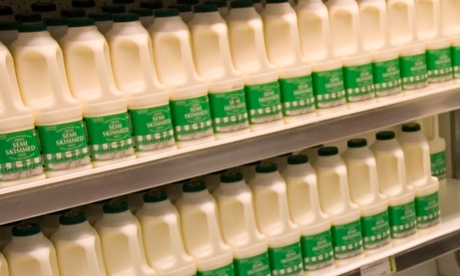
First Milk’s announcement that it will delay payment to farmers (Report, 13 January) in some ways is not a surprise. It highlights the deepening of the crisis facing dairy farmers in the UK. The number of milk producers in England and Wales has now fallen below 10,000, and there are suggestions that this number will halve by 2025. This is not because of inefficiency on farms; it is due to the drive for ever cheaper milk, which means only a few will be left standing. The use (or abuse) of milk by retailers as a loss leader amounts to playing with our food. A perception of cows in fields maintained by those selling milk and dairy products masks the steady march towards a future where milk and dairy products will increasingly flow from industrial sites rather than from traditional farms.
I started a farmer-led movement called Free Range Dairy and the Pasture Promise label to promote the value of Britain’s seasonally grazed dairy herds and to try to shift industry focus away from volume and towards value. The remaining cows in our fields can deliver so much more than bucolic images, turning abundant fresh grass, which we ourselves cannot digest, into a wonderful, nutritious food. If we are to secure a truly sustainable supply of healthy and affordable milk and dairy products for our nation, we must all take responsibility for the food choices we make. That is why I would like to see clear labelling on milk cartons and packaging that will enable consumers to make an informed choice about the provenance of the dairy in their diet and reward farmers with a fair price.
Neil Darwent
BBC outstanding farmer of the year, Frome, Somerset
• You quote NFU president Meurig Raymond stating that “liquid milk in particular is now cheaper than water”. While I have every sympathy for the plight of dairy farmers, I assume that Mr Raymond is referring to that ultimate triumph of marketing, bottled water. A product that is 1,000 times more expensive than tap water, isn’t required to meet the exacting standards of the European drinking water directive (and frequently doesn’t), doesn’t taste any better and is responsible for its very own waste mountain. Water remains a fraction of the cost of milk (and bottled water). And no, I don’t work for a water company.
David Howarth
Steyning, West Sussex
• The headline on your editorial (13 January) says “Dairy farmers are being driven out of business. The groceries regulator should find out why”. It won’t take the regulator much effort to find the answer. Every dairy farmer, past and present, will tell you that in 1933 a progressive, forward-looking government legislated to form the Milk Marketing Board. Margaret Thatcher could not bear the thought of a co-op being successful and so legislated to have it closed down in 1994, much to the delight of her friends the supermarkets.
David Lucas
Bath
• Your editorial says that “Britain consumes more than four-fifths of the milk it produces, but its price is dictated globally, by the cost of producing milk in, say, New Zealand or the US”.
Is this not a striking example of the much wider need to get real about the sort of economy we want to live in? If it is true that our production can cover our consumption, it must be possible to separate the local price from the global price, ie we need to create, and live by, an understanding that it is good for all of us to pay more than the minimum conceivable price for this core product.
Ian Graham
Swansea







